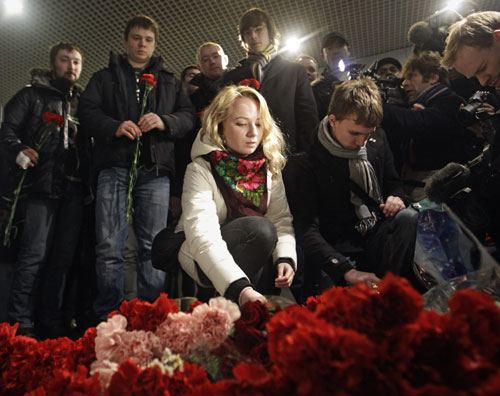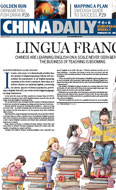Photos
Moscow airport security lapse blamed
Updated: 2011-01-26 07:12
By Li Xiaokun (China Daily)
Hu expresses condolences, vows support to fight terrorism
 |
|
Mourners place flowers on Tuesday in Moscow’s Domodedovo airport where 35 people were killed in a suicide bombing on Monday. [Photo/Agencies] |
BEIJING - Russian President Dmitry Medvedev on Tuesday blamed a security lapse for allowing suspected suicide bombers to kill at least 35 people and wound more than 180 others at Russia's busiest airport on Monday.
President Hu Jintao on Tuesday sent a message of condolence to Medvedev saying China "condemns terrorist attacks of any kind and resolutely supports Russian measures to fight terror". Premier Wen Jiabao and Foreign Minister Yang Jiechi also sent condolences to their Russian counterparts.
There was no immediate claim of responsibility for the attack at Moscow's Domodedovo airport, which Medvedev called a national "tragedy". But analysts said the attack bore hallmarks of militants fighting for an Islamist state in the North Caucasus region on Russia's southern frontier.
|
||||
"The special services had received information that an act of terror would be carried out at one of the Moscow airports," a security source told the Russian News & Information Agency (RIA Novosti).
The agency said it was likely that two terrorists, a man and woman, were on the scene. It quoted police sources as saying that the suspected female suicide attacker detonated the explosion when she opened the man's suitcase.
Russian investigators said they had found a head presumed to have belonged to the suspected male suicide bomber.
Eight foreign nationals were killed in the attack, a preliminary list unveiled by the Russian Emergency Situations Ministry said.
According to the list, two Britons, a German and a Bulgarian are among the dead, along with one person each from Uzbekistan, Kyrgyzstan, Tajikistan and Ukraine.
Nine bodies have yet to be identified.
There have been no reports of any Chinese people injured in the blast.
Calls to the Chinese embassy in Moscow on Tuesday afternoon were not answered.
Russia's Health Ministry said on its website that of the 110 people taken to hospitals following the attack, four were in extremely serious condition with 39 others in serious condition.
The event prompted Medvedev to call an emergency Kremlin meeting and postpone a trip to the Davos international investment forum at which he was due to introduce Russia's resurgence in a keynote address.
Moscow Mayor Sergei Sobyanin pledged that the city government would pay 2 million rubles ($67,000) in compensation to the families of those killed.
Each of those severely wounded will receive $50,300 and people with lesser injuries will receive $33,500 each, Sobyanin said.
US President Barack Obama called the attack "outrageous" while German Chancellor Angela Merkel described it as "cowardly".
"We should never allow the terrorists to win," British Prime Minister David Cameron said.
NATO chief Anders Fogh Rasmussen also expressed the Western alliance's "solidarity" with Russia.
"We are in this fight together," the organization's secretary- general said in a statement.
RIA Novosti has cited unnamed sources as saying that the tactics of the Monday blast were "the same" as those used in the 2010 metro blast.
Double bombings carried out by two female suicide bombers from a North Caucasus terrorist group on the Moscow metro on March 29, 2010 killed 40 and wounded more than 100.
"According to the preliminary version of the investigation, the (Monday) terrorist attack is linked to the latest events in the North Caucasus," said Russia's Kommersant business daily.
Russia is due to host the 2014 Winter Olympics in Sochi, on the edge of the Caucasus, which some rebels consider part of the territory they aim to include in an Islamic state.
North Caucasus rebels have threatened attacks against cities and economic targets in the run-up to parliamentary elections this year and the 2012 presidential poll.
Li Wei, director of the anti-terrorism research center under the China Institutes of Contemporary International Relations, said he also believes terrorists from the North Caucasus were the culprits.
He said the attackers chose the arrivals hall because it is the weakest point, in terms of security, at an airport.
The 2010 Moscow metro blast has showed the "fierce attacking capability" of these terrorists, Li said.
The metro blast resulted in strengthened subway security around the world, while the Moscow airport attack is likely to put global airports on high alert, he said.
Security at Beijing's main airport was tightened on Tuesday, ahead of the travel surge for the Lunar New Year, which falls on Feb 3.
Airport patrols were stepped up, more bomb-sniffing dogs deployed and greater attention focused on security camera surveillance.
Cui Hongjian, an expert on European studies with the China Institute of International Studies, said terrorist attacks have long been a severe challenge for the Russian government.
"So the fresh attack is a test for Moscow, not only in handling terrorism but also in its national security strategy," he said.
Xinhua, Reuters, AP and Wang Di contributed to this story.
E-paper

Chinese tourists as top shoppers
Since last summer, Chinese tourists emerged as the top tax-free shoppers in Europe.
Golden run ahead
Looking abroad
Mapping out a plan
Specials

The green lantern
Environmental concerns are shedding new light on a colorful tradition

Inland interchange
Chongqing bets on its position as a hub for China's west.

Zooming in on Chinese skies
Helicopter companies ride on country's growing interest in luxury aviation.




